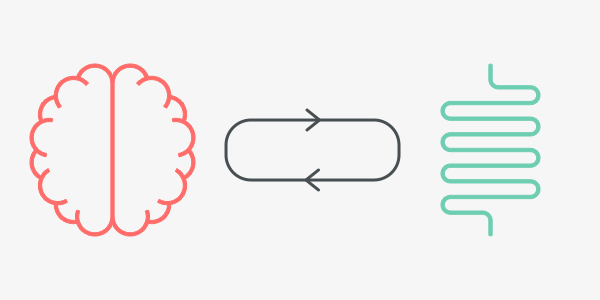The Gut-Brain Axis: What You Need To Know

Are you aware of your gut-brain axis and the power it can have in your body? It’s something that everyone has, and it can affect both your gut health and your mental health. Put simply, it describes the brain gut connection, which affects so much more of your body than you’re probably aware of.
Read on to find out everything you need to know about the gut-brain axis, and how this vital gut brain connection affects your health and wellbeing day-to-day.
What Is The Gut-Brain Axis?
The gut-brain axis is the communication system that links your gut and your brain. The two are more connected than you might think, and are constantly sending singles back and forth to one another via the vagus nerve.
The microbiota in your gut (these are the microbes – not to be confused with the microbiome, which refers to the microorganisms and their genes in your gut) speak to the neurons in your brain by way of the vagus nerve, which is one of the largest and most complex nerves connecting the brain to the gut, and is integral to the brain gut connection.
The two also communicate via neurotransmitters, which are chemical messengers secreted by neurons and can be transmitted within milliseconds. The 500 million neurons in your gut are in direct contact with the billions of neurons in your brain, forming the gut-brain axis, with the microbiota potentially affecting your behaviour.
One of the most important neurotransmitters involved in the gut brain connection is serotonin, also known as the ‘happy hormone’. A huge 95% of serotonin is produced in the gut – not the other way around as most people would believe, making it a key part of the gut-brain axis. Another neurotransmitter produced by your gut microbes is gamma-aminobutyric acid (GABA), which controls feelings of fear and anxiety. Studies show that increased GABA can lower anxiety and depression-related behaviours. As these two examples show, the gut-brain axis plays a key role in our mood and overall mental wellbeing.
The Gut Brain Connection: What Does It Affect?
The all-important gut brain connection can affect a wide range of processes in the body, which can lead to the development of both physical and mental health conditions in some cases. Research suggests that the gut-brain axis can affect the following:
- Depression
- Anxiety
- Autism
- Obesity
- Eating disorders
Each of the above has been linked to an impaired gut, emphasising the importance of having a well-functioning gut-brain axis.
Research has also been carried out into the gut-brain axis and IBS (irritable bowel syndrome). One study into the brain gut connection found that people living with IBS and Crohn’s disease had reduced vagal tone (this refers to the activity of the vagus nerve). Having a well-functioning vagal tone means that your body can relax faster after stress; if the vagal tone is impaired, studies suggest it could make you more susceptible to mental health issues. In fact, in 2005, the FDA approved the use of vagus nerve stimulation as a treatment for depression, demonstrating just how powerful the gut-brain axis is.
How To Look After Your Gut-Brain Axis
It’s important to take care of your gut-brain axis to benefit both your gut health and your brain health. You can do this by making sure your gut is full of diverse bacteria, and that your brain is well-fed with essential nutrients. Other ways to look after your gut-brain axis include:
Eat a balanced diet: ensure you have a healthy balanced diet full of colourful vegetables, fibre, and fermented foods
Cut down on sugar and carbs: reduce your intake of sugar and refined carbohydrates, as these can increase your levels of pathogenic bacteria
Get regular exercise: the microbiomes of physically active people are known to be more healthy and diverse
Avoid antibiotics where unnecessary: using antibiotics when you don’t necessarily need them can affect the diversity of your gut bacteria, which could in turn affect your gut-brain axis. However, if you have symptoms that aren’t going away and you think you might need antibiotics, you should always speak to your GP, who will be best able to advise
Get plenty of sleep: if you’re not getting enough sleep, you’re more likely to feel tired and stressed, which can have an impact on your gut health – another example that demonstrates the gut brain connection
Take a probiotic supplement: our Daily Synbiotic gut health supplement contains Bifidobacteria and Lactobacillus probiotic strains, which some studies show can have a positive effect on stress and anxiety levels
Try a prebiotic supplement: try taking a prebiotic-packed gut health supplement, such as Aguulp for Gut, our powerful blend of vitamins, amino acids, collagen, and prebiotics, which helps to feed and stimulate the growth of good gut bacteria, support the gut lining, reduce bloating, and contribute to regular, healthy bowel function
To further support your gut-brain axis, you might like to take Aguulp for Gut alongside our Aguulp for Brain supplement. These gut health supplements can work symbiotically, fighting inflammation, IBS, and Crohn’s, helping to improve anxiety and depression, and increasing focus and motivation. Try our Gut & Brain Dual Pack now for a month to feel the difference for yourself.
Shop the complete collection of gut health supplements available at Aguulp today.
Sources
- https://www.medicalnewstoday.com/articles/318128#Further-research-and-considerations
- https://foodandmoodcentre.com.au/2020/09/lactobacillus-and-anxiety-whats-the-link/
- https://pubmed.ncbi.nlm.nih.gov/25879690/